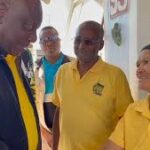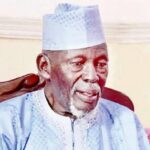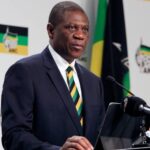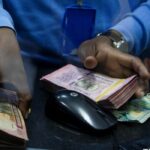Coups d’état in West Africa and natural disasters in North Africa have taken the international media spotlight away from what was, until mid-2023, their favourite hotspot on the continent: the Great Lakes. However, the next 12 months are likely to draw them back into the heart of a crisis – the one in eastern Democratic Republic of Congo (DRC).
The tug-of-war between DRC President Félix Tshisekedi, who is preparing to go after the votes of his fellow citizens at the end of December, and his Rwandan counterpart Paul Kagame, who will undoubtedly stand for his fourth re-election in August 2024, continues against a backdrop of chronic – and deadly – instability in the Congolese province of North Kivu, the M23 rebel movement, and antagonistic geo-economic interests, with no one able to predict the outcome.
Kagame spoke to Jeune Afrique journalist François Soudan on 12 September, by videolink, about this volatile context and the upheavals shaking the continent.
Excerpts:
Mali, Burkina Faso, Guinea, Niger and now Gabon… in less than four years, there have been coups in five countries on the African continent. What do you make of this epidemic and the return of the military to power in these countries?
Do these events just happen, without any explanation? I think they are often the result of an accumulation of grievances over several years. We can analyse them, find that these reasons are either valid or not, but there are inevitably factors that lead to this extreme. I’m not surprised.
An epidemic? It’s possible. You don’t realise what’s happening until it’s too late, when you’ve reached the point of no return, even though the virus has been with us all along. Every change or implosion in these countries can be summed up in one word: governance. Governance and then security. This is what lays the foundations for a country’s development, provided they are managed in the right way.
How should we deal with this kind of situation, which runs counter to the principles of the African Union? Military intervention? Economic sanctions?
Does the fact that the African Union or the rest of the world condemns a coup solve the problem? No, because these kinds of events keep happening. This means that condemnation is not enough. Furthermore, is a coup d’état only the result of a military putsch? If you have an unpopular civilian government and they change the Constitution to suit their personal ambitions and not those of their people, why aren’t they condemned?
It’s this kind of situation that means people don’t take to the streets to support the overthrown president and end up showing their support for the leaders of the coups. It’s one thing to condemn coups, but Africa and the African Union must not ignore the factors that lead to them.
What is your view of the ‘anti-French feeling’ that has taken root in most of the countries affected by these coups, a feeling that existed for a long time in Rwanda after the Tutsi genocide?
There is certainly a very negative feeling about the interference of foreign powers in African politics. It doesn’t matter whether it comes from France, the United States, the United Kingdom or Belgium. There is a real rejection of this attitude, and rightly so, and these countries need to realise this, but that does not excuse the problems facing our continent, which concern us first and foremost.
As part of your West African tour in April you visited Mamadi Doumbouya, who came to power in 2022 following a coup d’état. Do you see the coup leaders as legitimate interlocutors?
Do countries boil down to their president? I think that’s where we’re going wrong. We often only talk about heads of state, forgetting about the people. If the people come to the conclusion that there needs to be a change of government, it doesn’t matter to them who comes after the president who has just been overthrown, they try a new leader. If that leader also disappoints, they will support someone else.
We mustn’t lose sight of those who are less visible but who also play their part behind the scenes.
We are often superficial in the way we deal with very serious problems. We often limit ourselves to asking which presidents on this continent are appreciated, or not, by their peers. We must take full responsibility for what happens on this continent, for our failures as well as our successes.
For the second time in six months, UN experts have singled out Rwanda for its active support for the M23, even detailing the chain of command involved on the part of your army, based on aerial images, photos and testimonies. Is this not irrefutable evidence?
I don’t know what these people are experts in, but let’s assume that this group has written a report. Most of the things reported by these experts do not correspond to the facts as we know them.
Is DRC’s problem the M23 or is it really Rwanda? Would Rwanda and the M23 be DRC’s problems and that’s that? I ask because in this report there is little or nothing on the history of the Congo’s problems, on the responsibility of Congolese institutions, on the crimes committed by the FARDC… This has been going on for over 20 years, despite the presence of a UN mission that has cost billions of dollars. Why is there no mention of the results of this mission? Are these questions of no interest?
If Rwanda is accused of what you have just mentioned, what could be the reason for its involvement [in DRC]? Why are the experts silent on this, on the presence of the FDLR in this region for all these years, on the threat they pose to Rwanda and to DRC itself? The Congolese government has openly brought together people who claim to be anti-Rwanda, who want to bring down the Rwandan government. The Congolese president receives them, but these experts do not talk about it.
They only publish what is incriminating against Rwanda, such as its alleged support for the M23, and remain silent on the rest, on what is at the root of the problem in DRC. It all boils down to Rwanda’s responsibility, but Rwanda does not exist thanks to them.
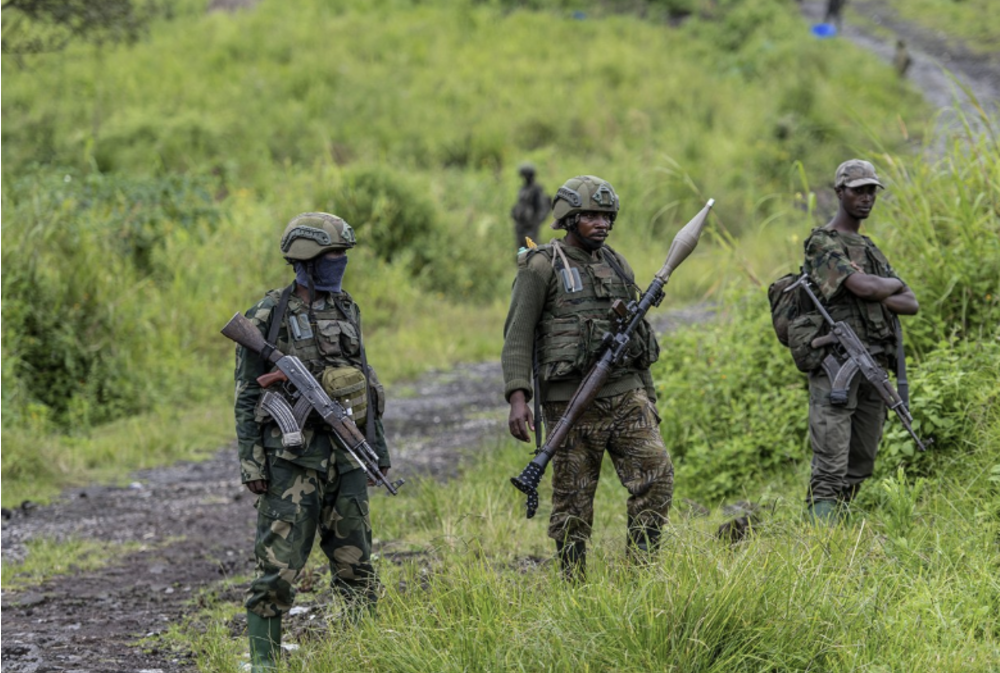
M23 rebels at the formalisation of their withdrawal from the town of Kibumba, eastern DRC, December 23, 2022. AP/Sipa
For several months now, DRC and Rwanda have been engaged in two mediation processes, in Luanda and Nairobi. Has the diplomatic route failed?
No, because the efforts of the East African Community (EAC) have enabled a force to be deployed on the ground. This force has done an excellent job of calming things down. I am surprised to see that this is the only solution that has so far produced results, with a ceasefire that was generally respected despite a few clashes here and there, that the Congolese authorities want to put an end to its presence.
This is surprising. Whatever efforts have been made to date, the Nairobi and Luanda processes are the only ones to have helped calm things down.
Yet the impasse persists. On the one hand, the Congolese government refuses to enter into dialogue with the M23, and on the other, the rebels say that they are not concerned by the cantonment process. Has the resumption of armed confrontation become inevitable?
Why not blame the right people for the situation? If there are criticisms to be made of Rwanda, we accept them, but why don’t you ask me why Rwanda is not dealing with the problem of these people? That is not my responsibility. The members of the M23 are Congolese citizens.
Shouldn’t the regional force intervene if the deadlock persists, as its mandate authorises it to do?
Why do you think that if they are on the ground, it’s because they have to fight the M23? Where do you get that from? They are on the ground to fight anyone who violates the ceasefire, which is not the same as fighting the M23. Those who advocate that are those who want to continue fighting and are not allowing the political process to continue.
You are right, in a way, that for the political process to take place, DRC must stop rejecting it. If you don’t want dialogue, as the Nairobi and Luanda processes provide for, then what do you want? The leaders are not taking responsibility. If they don’t want to talk to them, then what solution and where does that leave us?
Is dialogue still possible with President Tshisekedi?
Would someone who refuses to talk to his own citizens talk to me? Wouldn’t that be strange? I have always been willing to talk to him. In fact, we spoke a lot together at one time and the problems we’re facing today were already at the heart of our discussions.
Will talking to each other today just for the sake of talking solve our problems? Or should we talk because there is a concrete opportunity to resolve the situation? We’ve already done a lot of this, meeting just to talk. I’ve always agreed to talk to him and I’ve always been available for him to come and talk to me, but why would coming to talk to me be an obstacle to the discussions he needs to have on his own to resolve the problems he has with his own citizens? People say that the problem is between Kagame and Tshisekedi, but that’s not it.
Do you think the forthcoming presidential elections in DRC will have an effect on relations between the two countries?
I don’t really know and for the moment, I don’t care.
With six months to go until the commemoration for the 30th anniversary of the Tutsi genocide, do you feel that justice, albeit imperfect, has been done for the victims?
I do. No situation is perfect, but there has been immense progress. That’s why the country is stable. We have not satisfied everyone on the victims’ side. There has been too much suffering, suffering that can never be made up for.
Even on the side of those who committed genocide, progress has been made. First of all, to ensure that justice is done. But also to create a space so that people can become better citizens of this country. The victims have complaints. Those responsible also have their problems. But we have made great strides, on the scale of what we could do.
In December 2022, you stated that Rwanda would not be intimidated in the Rusesabagina case. His sentence was finally commuted in March, apparently following negotiations with the United States. Had he become too diplomatically cumbersome?
There has been a certain amount of confusion in this affair from the outset. Some countries got involved in the case, forgetting the crimes in which this person participated. These countries come from a part of the world with which we have to do business. We do not live in a perfect world, but we have managed this situation according to our own understanding of this issue.
We have managed to achieve a number of things. With regard to the problem of Rusesabagina and his associates, the narrative is now clear. Some people don’t want to hear about it, but many of those who wanted to understand, have understood.
No matter what we agreed behind the scenes, where he is today, this individual has returned to his old ways. We’ll see how to deal with that later.
After four years of frosty relations with Uganda, things now seem to be back on track. Many previous attempts at mediation had failed. Why did that of President Museveni’s son, Muhoozi Kainerugaba, convince you?
Obviously individuals are important, especially at this level of responsibility. What they do, how they behave, all that counts… We mustn’t lose sight of those who are less visible but who also play their part behind the scenes, enabling individuals to succeed – or contributing to their failure.
If General Muhoozi Kainerugaba has succeeded, it is partly because we did what we had to do on our side, with the help of our partners, and because he too has received help – I would like to believe, even from his own father. Perhaps what his father couldn’t say yes to directly, he said through his son. That’s possible. The important thing is the result.
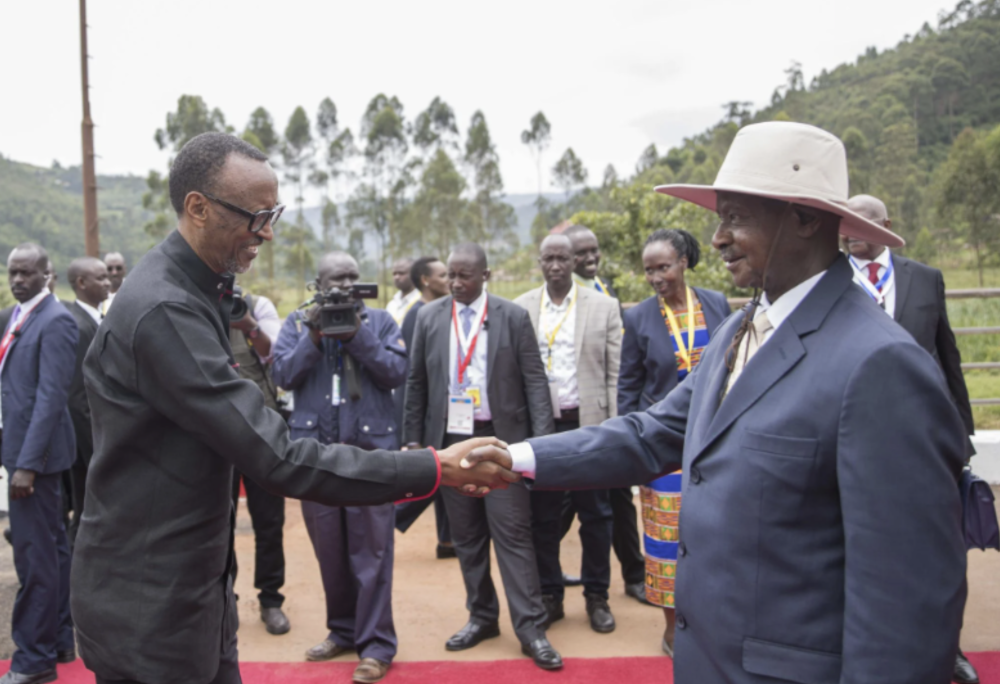
© Rwandan President Paul Kagame and his Ugandan counterpart Yoweri Museveni, in Kigali, February 21, 2020. Xinhua
In the Central African Republic and Mozambique, where you intervene in support of the authorities, Rwanda has stepped up its economic offensive. How do you respond to those who suspect you of tying your military aid to economic considerations?
First of all, we are not the cause of the problems for which we have been asked to intervene militarily. I say this because certain countries have, in the past, caused problems on the continent and then came in to solve them while reaping economic dividends, plundering these countries without even having been asked to intervene. That’s not how we operate. Whether in the Central African Republic or Mozambique, it is the authorities of these countries who have asked us to intervene.
Then, leaving aside political considerations, let’s talk about the financial aspect. For a country to intervene, whether under a UN mandate or under a bilateral agreement, it requires financial resources. In the case of UN missions, if we take the Central African Republic, the soldiers are paid from the UN budget, but the other part of our forces involved in bilateral operations is paid neither by the Central African Republic nor by the UN. We have to pay them ourselves.
But we’re not France, we don’t have the resources to fund this kind of operation. So someone else has to do it. Neither the Central African Republic nor Mozambique have the financial capacity. In the case of Mozambique, we asked the European Union for help, which has responded by releasing a budget of €20m ($21.4m), but this represents only a tiny fraction, barely 10%, of what has already been used and what will have to be spent.
So these countries said to us: “Since no one has the means to pay you, since neither you nor we have the money to finance these operations over the long term, and since it’s not up to Rwanda alone to pay for your operations here, let’s find another way of working. We have internal resources, so we can find a way to compensate for your investment.” It’s as simple as that. You can make an issue out of it, say what you like about it, but these are the facts.
Belgium recently refused to appoint Vincent Karega, the diplomat you had nominated to head up your embassy in Brussels. Has this refusal had an impact on relations between the two countries?
We did indeed appoint Vincent Karega to the post of Rwandan ambassador to Belgium, but after a long wait, the Belgian authorities suggested that we put forward another name. Naturally, we asked why. After all, they have every right not to accept our proposal. But when that happens, you have to at least give an explanation to justify it. The answers we were given were far from satisfactory. They put arguments on the table that have no basis in fact. We therefore felt that we needed a better explanation and that we weren’t going to change our position and send another ambassador.
What is democracy? The West dictating to others what they should do, but if they violate their own principles, how can we listen to them?
We realised that there must have been other reasons for the refusal. Our interpretation is that it is clear that this refusal was dictated by DR Congo rather than for other reasons.
Vincent Karega was our ambassador in Kinshasa before being declared persona non grata, not because of his behaviour but because he was the representative of Rwanda, a country with which the DRC has problems. The problem was not with him personally, but with Rwanda. So we left it at that and we have no intention of appointing another ambassador.
Last June, the UK courts ruled that the planned deportation to Rwanda of migrants who had arrived illegally on British soil was ‘illegal’. One of the arguments put forward was that Rwanda was not a ‘safe country’. No migrants have been sent to Rwanda since the agreement with the UK was signed. Shouldn’t it be abandoned now?
This problem only arises on the British side. We are talking about irregular migrants in the UK, with asylum procedures being managed there, as are the courts that make the decisions you’re talking about. Why should this concern me? If the courts come to the conclusion that this is an illegal agreement, it is more the United Kingdom than Rwanda. We would simply be welcoming people within the framework negotiated with our partners. If these migrants don’t come because of a problem that concerns the UK, then it’s none of our business. We are not complaining about anything, not the British courts, not the British government, or anything else.
Last April you were re-elected head of the RPF with 99.8% of the vote. In the public opinion, this makes you the party’s candidate for the presidential election in a year’s time. Is this the case?
You just said that it was obvious in the eyes of public opinion, so it is the case. I am pleased with the confidence that Rwandans have shown in me. I will always serve them whenever I can. Yes, I am indeed a candidate.
As you know, from a Western point of view, the fact that you have been in power for more than 20 years is politically problematic. Do you think this viewpoint isn’t adapted to the reality on the African continent?
Sorry to the West, but what these countries think of us is not our responsibility. Personally, I no longer know what corresponds to Western values. What is democracy? The West dictating to others what they should do, but if they violate their own principles, how can we listen to them? Trying to transplant democracy is already a violation of democracy itself. People are supposed to be independent and should be allowed to organise themselves as they wish.
Your position on the Ukrainian conflict is difficult to understand. On the one hand, Rwanda voted in favour of a resolution condemning Russia’s invasion of Ukraine. On the other hand, during your recent tour of West Africa you accused the West of implicating Africa in its own problems, which fits with the Moscow narrative. Do you really think that neutrality is possible in this conflict?
It is possible in my case. I don’t have to take sides because I have nothing to contribute to the conflict. I have nothing to contribute to this debate. It is in the hands of other countries, it does not concern me. We voted in favour of the UN resolution because it referred to a singular principle. Whether it’s Russia, Ukraine or any other country, we can’t support the invasion of one country by another. There is no ambiguity about that.
But the problems of Russia and Ukraine do not end there. This is what the countries directly affected by this situation are telling us themselves…
What is Rwanda’s impact in all this? The great powers resolve things the way they want to. I’m not involved, even if this war affects us all, whatever our geographical distance from the conflict.
Are you satisfied with the integration of the African Union into the G20?
It’s a good thing, because we’ve been talking about it for some time, but I followed the summit and found that the chair of the African Union Commission, Moussa Faki Mahamat, was not present. There was only the current chairman of the African Union, my counterpart from the Comoros, Azali Assoumani.
This poses a problem. Unless the chairman of the AU Commission was unable to attend for personal reasons, I find it curious that he is not invited to this kind of event. As chairman of the AU Commission, Moussa Faki Mahamat is the legal representative of our continental organisation, especially as his term of office lasts five years, whereas heads of state take it in turns each year to chair the AU. The G20 has therefore done a good thing, but in a bad way.
This interview was first published by The Africa Report, a publication of Jeune Afrique Media Group.




